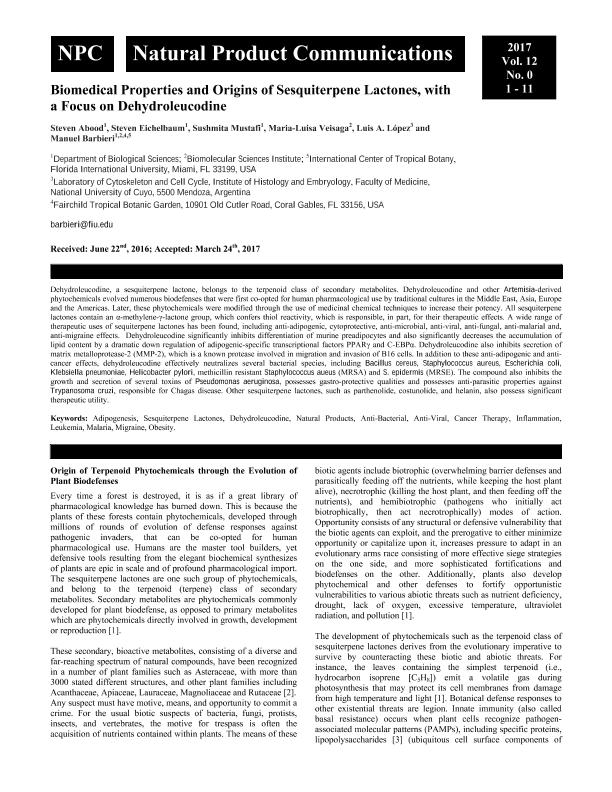Artículo
Biomedical properties of sesquiterpene lactones, with a focus on dehydroleucodine
Abood, Steven; Mustafi, Sushmita; Veisaga, Maria-Luisa; Lopez, Luis Alberto ; Barbieri, Manuel Alejandro
; Barbieri, Manuel Alejandro
 ; Barbieri, Manuel Alejandro
; Barbieri, Manuel Alejandro
Fecha de publicación:
03/2017
Editorial:
Natural Products
Revista:
Natural Product Communications
ISSN:
1934-578X
Idioma:
Inglés
Tipo de recurso:
Artículo publicado
Clasificación temática:
Resumen
Dehydroleucodine, a sesquiterpene lactone, belongs to the terpenoid class of secondary metabolites. Dehydroleucodine and other Artemisia-derivedphytochemicals evolved numerous biodefenses that were first co-opted for human pharmacological use by traditional cultures in the Middle East, Asia, Europeand the Americas. Later, these phytochemicals were modified through the use of medicinal chemical techniques to increase their potency. All sesquiterpenelactones contain an α-methylene-γ-lactone group, which confers thiol reactivity, which is responsible, in part, for their therapeutic effects. A wide range oftherapeutic uses of sequiterpene lactones has been found, including anti-adipogenic, cytoprotective, anti-microbial, anti-viral, anti-fungal, anti-malarial and,anti-migraine effects. Dehydroleucodine significantly inhibits differentiation of murine preadipocytes and also significantly decreases the accumulation oflipid content by a dramatic down regulation of adipogenic-specific transcriptional factors PPARγ and C-EBPα. Dehydroleucodine also inhibits secretion ofmatrix metalloprotease-2 (MMP-2), which is a known protease involved in migration and invasion of B16 cells. In addition to these anti-adipogenic and anticancereffects, dehydroleucodine effectively neutralizes several bacterial species, including Bacillus cereus, Staphylococcus aureus, Escherichia coli,Klebsiella pneumoniae, Helicobacter pylori, methicillin resistant Staphylococcus aueus (MRSA) and S. epidermis (MRSE). The compound also inhibits thegrowth and secretion of several toxins of Pseudomonas aeruginosa, possesses gastro-protective qualities and possesses anti-parasitic properties againstTrypanosoma cruzi, responsible for Chagas disease. Other sesquiterpene lactones, such as parthenolide, costunolide, and helanin, also possess significanttherapeutic utility.
Palabras clave:
Dehydroleucodine,
,
Inflammation
,
Leukemia
,
Obesity
Archivos asociados
Licencia
Identificadores
Colecciones
Articulos(IHEM)
Articulos de INST. HISTOLOGIA Y EMBRIOLOGIA DE MEND DR.M.BURGOS
Articulos de INST. HISTOLOGIA Y EMBRIOLOGIA DE MEND DR.M.BURGOS
Citación
Abood, Steven; Mustafi, Sushmita; Veisaga, Maria-Luisa; Lopez, Luis Alberto; Barbieri, Manuel Alejandro; Biomedical properties of sesquiterpene lactones, with a focus on dehydroleucodine; Natural Products; Natural Product Communications; 12; 3-2017; 995-1005
Compartir



